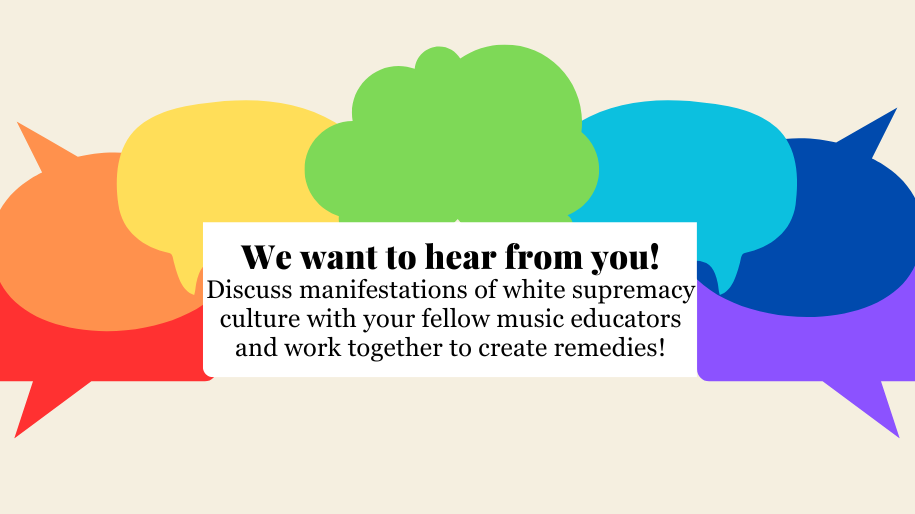This section aims to bring music education and community organizing concepts into conversation with each other in order to envision transformative, anti-racist communities in our classrooms* and beyond.
*Throughout this website, “classroom” is used to refer to any teaching or learning space and is not limited to formal school classroom settings.
Transformative Justice in the Music Classroom*
As evidenced by histories of colonization, enslavement, forced assimilation, and land theft, white supremacy has a long-standing tradition of disrupting and destroying communities in order to assert and maintain control (Okun, 2022b). Therefore, investing in communities is a necessary element of anti-racist education. As educators, we know that relationship-building is one of the most important ingredients for effective teaching, but we may not recognize the ways that it can transform our communities as well. Emergent strategy (brown, 2017; brown, 2021) offers us a framework for recognizing that change emerges from our interdependence and a multitude of small acts (read more in the “Underlying Frameworks” section of this website). The following section draws from the principles of emergent strategy and transformative justice to propose practices for creating a community within the music classroom*, engaging with families and community members, and participating in community organizing.
| Transformative Justice Principles | Practical Possibilities |
|---|---|
| “Move at the speed of trust. Focus on critical connections more than critical mass—build the resilience by building the relationships.” (brown, 2017, p. 27) | – Invite parents/community members into the classroom as observers and/or guest teachers. – Invite parents/community members to participate in curricular discussions. |
| “Center pleasure as an organizing principle…When people find movements that meet their needs, welcome them whole, affirm them, commit to their transformation, and actually feel good, they stay, and movement grows.” (brown, 2019, p. 248) | – Work to meet community needs: providing practice space, sharing instruments, practicing mindfulness, pivoting when students are tired, overwhelmed, or under-fed. – Ask parents/community members what is most needed for engaged learning. |
| “Never a failure, always a lesson.” (brown, 2017, p. 27) Shame and guilt limit our ability to create change. | – Own your mistakes openly and honestly. – Develop a culture of healthy accountability by affirming students’ growth from mistakes. |
| “There is a conversation in the room that only these people at this moment can have. Find it.” (brown, 2017, p. 27) | – Avoid assumptions or stereotypes about your students and their communities. – Give students opportunities to start the discussion or pick the repertoire. |
| “Less prep, more presence.” (brown, 2017, p. 27) | – Create flexible lesson plans that allow you to slow down or pivot in order to address what feels most important in the moment. Do not avoid critical conversations because of your need for urgency or “sticking to the plan.” |
| “What you pay attention to grows.” (brown, 2017, p.27) | – Use your classroom as a space to discuss community issues. – Use concerts as opportunities for community organizing or gathering. |
| “Transformative justice, in the context of emergent strategy, asks us to consider how to transform toxic energy, hurt, legitimate pain, and conflict into solutions. To get under the wrong, find a way to coexist, be energy moving towards life, together.” (brown, 2017, p. 75) | – Think critically about your school or organization’s processes for managing conflict. – Move away from the culture of punitive punishment and disposability that fuels the school to prison pipeline and the prison industrial complex. – Facilitate and model conflict transformation strategies that center healing and repair (this will often require you to slow down and create space). – Shift your focus from who/what is “right” to what is needed. – Teach your students how to deliver meaningful and genuine apologies. |
Pedagogical Frameworks
These pages survey two established educational frameworks that can help you develop a pedagogy of anti-racism in your classroom* and/or community.
Critical Hip-Hop Pedagogy
Culturally Sustaining Pedagogy
White Supremacy Culture Characteristics Forum
